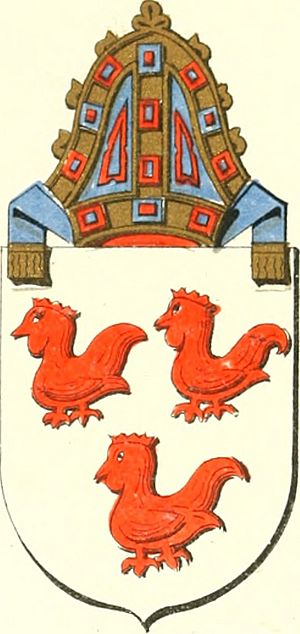Robert Cockburn facts for kids
Quick facts for kids Robert Cockburn |
|
|---|---|
| Bishop of Dunkeld | |

Coat of arms of Robert Cockburn
|
|
| Church | Roman Catholic Church |
| See | Diocese of Dunkeld |
| In Office | 1524–1526 |
| Predecessor | Gavin Douglas |
| Successor | George Crichton |
| Orders | |
| Consecration | Translated from Ross 27 April 1514 |
| Personal details | |
| Born | 15th century |
| Died | Dunkeld (?), 1526 |
| Previous post | Bishop of Ross (1507–1524) Parson of Dunbar |
Robert Cockburn (died 1526) was an important Scottish diplomat and church leader in the 1500s. He served as a bishop and helped Scotland deal with other countries.
Robert was the third son of William Cockburn and Marion, who was the daughter of Lord Crichton.
Contents
Early Life and Education
Robert Cockburn went to university and earned a degree. He first appears in records around 1501. At that time, he was given the job of parson of Dunbar by King James IV of Scotland. He was known as "Master Robert Cockburn" and was also a dean in Rouen, France. People admired his excellent skills in the Latin language.
Becoming a Bishop and Diplomat
In 1507, Robert became the Bishop of Ross. He was also the Chancellor for the church area of Dunkeld. The King chose him for the bishop role in the spring of 1507.
Robert Cockburn also worked as a chaplain for King Louis XII of France. He was a key diplomat for King James IV of Scotland. In 1507, Louis XII asked Robert to request 4,000 Scottish soldiers. These soldiers were needed to help defend a French area called the Duchy of Milan.
King James IV agreed to send help if he was warned ahead of time. Robert was then asked to discuss another important project with the French king. This project was likely King James's plan for a special religious mission. Robert carried similar messages in 1512, leading up to the Battle of Flodden. This battle was a major event for Scotland.
Later Diplomatic Missions
Robert spent much of 1515 in France. He was an ambassador for the government of King James V of Scotland, who was still very young. In 1517, he went to France again with Patrick Paniter. Their job was to update an old friendship agreement called the Auld Alliance. This important talk led to the Treaty of Rouen.
In 1524, Robert was in England as one of three ambassadors. They were sent by the Scottish government to agree on a peace deal. In that same year, on April 27, Robert was moved to become the Bishop of Dunkeld.
Final Years and Legacy
Robert became friends with Cardinal Wolsey, a powerful English leader. In 1525, he wrote to Wolsey about the political situation in Scotland. He mentioned that the Regent Albany, who had left Scotland for France, still had a lot of power. Robert also noted that his trip to England had created some enemies for him.
He was the Bishop of Dunkeld for only two years. Robert Cockburn passed away on April 12, 1526. He was buried in the main part of Dunkeld Cathedral.
Images for kids
 | Sharif Bey |
 | Hale Woodruff |
 | Richmond Barthé |
 | Purvis Young |


